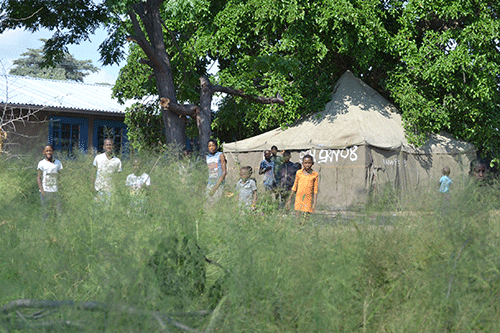KATIMA MULILO – In an effort to arrest the poor performance of academic results, the Zambezi region has been allocated N$17.6 million to construct 36 classrooms and four ablution facilities. Many learners in public schools continue to be taught in tents and make-shift structures due to a dire shortage of classrooms around Namibia.
As of the end of the 2022 financial year, the total number of classrooms needed across Namibia stood at over 4 000.
Unfortunately, the education ministry revealed it has secured only N$255 million to construct a total of 510 classrooms and 70 ablution blocks through August 26 Construction within three months.
This was announced by education deputy minister Faustina Caley during a regional consultation on Thursday in the Zambezi region on improvement strategies aimed at producing better national results in 2023 and beyond.
Zambezi remains one of the regions that performed poorly during the 2022 academic year in Grade 11 and 12 (AS) national results.
The region also faces poor and inadequate education physical facilities; inadequate teaching and learning aids, such as tools and equipment, chemicals, textbooks and computers, and there is no systematic and structured support for learners and teachers.
Other pressing challenges faced by the education fraternity in the region and elsewhere in Namibia are weak monitoring and evaluation at all levels – from the classroom, school, circuit, regional office and head office, as well as insufficient career guidance at schools and misplacement of skills.
Caley admitted the ministry is well aware of the shortage of classrooms across the country and the negative impact it has on teaching and learning.
Other financial allocations include the largest chunk of N$40.8 million for Khomas to build 84 classrooms and nine ablution facilities, followed by Erongo, which received N$33.7 million to build 51 classrooms and nine toilet blocks.
Oshana received N$29.6 million to build 58 classrooms and 12 ablution amenities, while Oshikoto received N$23.6 million for 58 classes and three ablution blocks. An amount of N$23.1 million has been allocated to the Ohangwena region to build 46 classes with nine blocks, and Otjozondjupa gets N$17.6 million for 35 classrooms and seven ablution facilities.
Meanwhile, Kavango East received N$21.8 million for 41 classes with six ablution amenities, compared to Kavango West, which received N$11.3 million to construct 20 classes and four blocks.
For the Omaheke region, government allocated N$10.8 million for 24 classes and four blocks, while Omusati got N$4.8 million to build 11 classes with no ablution facilities and Kunene received N$3.6 million for nine classrooms – also with no provision for ablution facilities.
The other funding of N$7 million goes to Karas for 13 classes and two blocks, while the Hardap region received N$10.3 million for 24 classes and two ablution facilities.
Caley said what is worrisome is that regions have classroom needs while learners are being taught in tents and other makeshift structures.
“But when projects are allocated to regions, there are always delays and bureaucracy from our officials in getting these projects off the ground. A case in point is that some regions still haven’t completed the Covid projects – something which leaves a bitter taste in my mouth,” she noted.
The ministry also budgeted N$30 million for furniture and the funds will be equitably transferred to regions.
Caley mentioned N$40 million has been budgeted for textbooks and the funds will be transferred to regions from July 2023.
“Nonetheless, the regions have already started with the procurement process and we hope that this process will be expedited with the speed and urgency it deserves because textbooks are a critical ingredient to the comprehension of subject content by the learners. The ministry recognises the challenges with textbooks development in especially African languages due to lack of financial gain by publishers,” she reasoned.
She encouraged schools to reach out to NAMCOL to receive training on NotesMaster for teachers and learners.
Further, she said the budget allocated for school grants is N$184.9 million, and the process of transferring funds to schools has commenced and is still ongoing.
“I hereby would like to humbly request schools to exercise patience while the head office is finalising the transfer process,” Caley pleaded.
Furthermore, the ministry has budgeted about N$88.8 million for stationeries.
Caley emphasised the speedy regional procurement of stationery for schools to be well-prepared to start the 2024 academic year.
“History has taught us that some regions have a chronic culture of procurement in-fighting and procrastination, a culture that has a detrimental effect on educational outcomes and denies schools and learners opportunities owed to them to perform to the best of their abilities. I would, therefore, like to urge the regional councils and directorates to desist from such acts because it hampers the developmental and preparedness agenda of the schools,” she remarked.
– anakale@nepc.com.na
Pic: Zambezi classes


